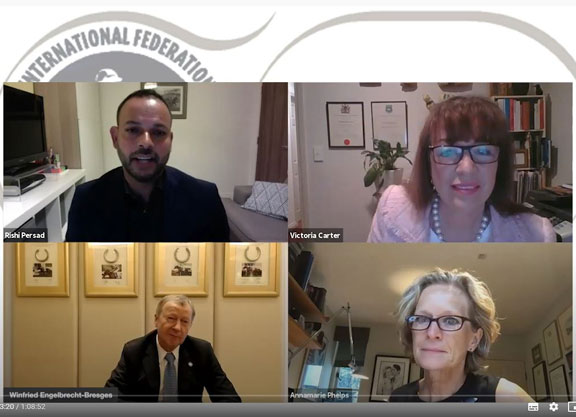The virtual International Conference of Horseracing Authorities, organized by the International Federation of Horseracing Authorities, came to a close on Wednesday with the release of its fourth and final session, where racing administrators around the world looked at how COVID-19 has impacted racing, the positives and negatives that have come out of the pandemic and what must be done to ensure racing thrives moving forward.
The IFHA Conference is typically held in-person in Paris, France the day after the Prix de l'Arc de Triomphe, but in light of the pandemic this year it was conducted as a series of videos released throughout the first part of October.
Rishi Persad moderated Wednesday's fourth session, which was split into two panels comprising Victoria Carter (New Zealand Thoroughbred Racing), Winfried Engelbrecht-Bresges (Hong Kong Jockey Club and IFHA), Annamarie Phelps (British Horseracing Authority), Horacio Esposito (Organizacion Sudamericana de Fomento del Pura Sangre de Carrera), Drew Fleming (Breeders' Cup) and IFHA Vice-Chairman Brian Kavanagh (Horse Racing Ireland).
The panelists discussed the ways in which racing has increased its focus on digitalization, the importance of strong relationships with government and how a likely decrease in foal crops will affect racing products.
Engelbrecht-Bresges and Fleming provided updates on the work being undertaken in the lead-up to two key international racedays: the Hong Kong International meeting in December and the Breeders' Cup at Keeneland in three weeks' time.
“We've had a very good response from major trainers around the world who would like to come, and we have special quarantine facilities now in place for grooms who will come,” Engelbrecht-Bresges said. “They'll fly over two weeks earlier, then their horse will fly over and they'll take it over. And we're talking about introducing a special health protocol for jockeys that they maybe only have to do one week [of quarantine]. All our jockeys are tested four times a week for COVID and we want to introduce with overseas jockeys coming that they're tested twice before they leave. When they arrive in Hong Kong they'll go into a special dedicated Hong Kong Jockey Club facility to quarantine for a week.
“We have five or six top international jockeys who have committed to come for our international races if the [pandemic] circumstances don't change.”
Fleming said Breeders' Cup continues to work with the government and homeland security to secure the necessary paperwork to allow horsepeople to travel with their Breeders' Cup runners. He also touched on some of the ways his team will be bringing the Breeders' Cup to those watching at home.
“At the Breeders' Cup this year we're planning to have what's called a back camera, which is a camera that's on two cranes that swings across,” he said. “We'll have more television cameras than we've ever had so we can get all angles of every horse as much as possible. We're going to have a virtual reality camera in the walking ring. Some of that will be on television but a lot of that will be through the second screen, your mobile device.
“Someone told me, and it's resonated with me for a long time, that the average person scrolls on their screen the height of the Empire State Building every single day. So you need to make sure what's on the screen is really creative and innovative to really capture the audience's attention.”
Not a subscriber? Click here to sign up for the daily PDF or alerts.






